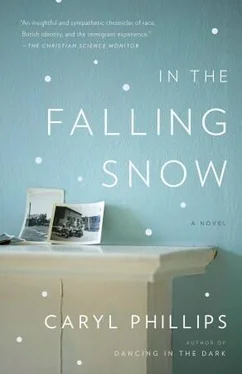He dashes across Uxbridge Road before reaching the pedestrian crossing, and moves towards the building society cash machine. He really doesn’t need any hassle at work, especially not now when the local authority seem determined to make his life an administrative nightmare by merging his Race Equality unit with Disability and Women’s Affairs. He was pleased when Clive Wilson called him in and told him that as the chief executive he had decided that a certain Mr Keith Gordon should be the one to head up the merger, for it meant more money, a bigger office, and double the number of staff to manage. He soon discovered that it also meant learning about the problems of wheelchair accessibility, understanding why rape crisis centres could not be funded if they excluded male rape, coming to terms with the irony of being an able-bodied black man speaking on behalf of disabled white people, and being the highly visible male spokesperson for feminist groups, many of whom appeared to despise men. The workload was such that it was no longer possible for him to leave the office early and go back to the flat and work on his book. These days it was also unlikely that having surreptitiously scanned Time Out or the Guardian and discovered that some refugee from the seventies such as George Clinton or Sly Stone was playing in Tooting or Brixton, he could just shoot off early from work and go down to the gig with his notebook. After the announcement of the merger, most evenings were taken up with his trying to digest the contents of thousands of pages of printed policy reports, and then adding to the rubbish with short directives of his own. Then he noticed Yvette, who had recently been recruited as a research assistant in his unit. As he tried to tell her over pizza, he didn’t fall asleep at the cinema because he was bored, but because these days he simply has too much work to do and he often finds himself still awake at two o’clock in the morning trying to make sense of endless reams of local government bureaucracy.
He grabs the five £20 notes and tucks them into his wallet before slipping the thick wad back into his pocket. A sudden gust catches an abandoned newspaper and it begins to fly in all directions. He kicks away a few pages that are swirling around his feet and begins to move off in the direction of his flat. There are very few people out walking on this windy Sunday night, and he imagines that most folks are sensibly at home watching television or already safely tucked up in bed and getting ready for another week of work. For over twenty years he shared a front door with Annabelle, which meant that there was always a good chance that he would not be coming home to an empty house. The lights would be on, and the smell of cooking would have permeated the flat or the house, and perhaps there would also be the sound of music blaring out. After graduation they had decided to stay in Bristol, and so they moved out of their respective halls of residence and into a slightly damp one-bedroom flat in the supposedly respectable Clifton district. He accepted a job in the black community of St Paul’s, and Annabelle also successfully applied for a position in social work, although her own particular focus was single women and violent men. After a difficult pre-graduation dinner with her mother and father, Annabelle had decided not to apply for any jobs in publishing, which would have meant moving to London and perhaps spending the occasional weekend in Wiltshire with her parents. At the dinner, she finally introduced her boyfriend of two years to them, but having witnessed her father’s behaviour Annabelle had decided that there was nothing further to be gained by trying to be diplomatic. They had forced a choice upon her, and so she had chosen. The idea of moving into social work interested her, and it seemed practical given her boyfriend’s vocation but, after four years in Bristol, Annabelle felt burned out and in need of a change.
They were offered a husband and wife job in residential care in Birmingham and, without even thinking about it, they went one morning to a registry office in Bristol and asked two guests who were there for the wedding before their own if they would stay on for a few minutes and be witnesses. The registrar would not look them in the face, and the man’s hand shook as he turned the book around for them to sign. Having blotted the ink dry, the registrar handed the certificate to the husband, who quickly folded it in half and gave it to Annabelle, who pushed it into her handbag. They then drove out to a country pub for a celebratory lunch that soon descended into silence. He knew that as happy as Annabelle was with him there was no getting around the fact that Annabelle’s parents had ‘let her go’, and that he had no real family to offer her as a substitute. After two difficult years in Birmingham, a city they both loathed as much for the grating accent as the labyrinth-like city centre, it was he who suggested that they move to London and that Annabelle might consider switching careers and trying to get a job in the media. They had saved enough to put down a small deposit and buy their first property, a tidy Victorian terraced house by the village common in an unfashionably scruffy part of west London, and while he took up his new job as a community liaison officer for the local authority, Annabelle found employment reading scripts for a theatrical agency who, as though already anticipating how her life would develop as both she and her husband now closed in on thirty, suggested that she could work some days from home. Three years later, and only months after Mrs Thatcher was finally removed from office, Laurie was born. In addition to the house being filled with the aroma of cooking, and the sound of music, there was now the babble of a newborn child and the breathless gunfire of his excitable laughter.
By the time young Laurie found words, his father was pouring most of his energy into the local authority’s nascent Race Equality unit, which he one day hoped to lead. Laurie’s words soon took the form of a mild interrogation as he learned to ask, ‘Where have you been, Daddy?’ and ‘What did you do today, Daddy?’ and then eventually, ‘You’re not going out again are you, Daddy?’, and Annabelle would shush him while chopping carrots, or basting a chicken, or pushing her fingers into a batch of buns to see if they were ready. As he invested increasing amounts of time in his work, Annabelle’s supply of scripts and freelance work started to dry up, but it appeared to him that she had plenty to occupy herself with coping with Laurie and trying to be a pillar of support for her mother whose devotion to her grandson was genuine but, according to Annabelle, masked an increasingly obvious gaping void at the heart of her own life. He could see that Annabelle was struggling to cope with her own family situation and he was actively looking for an opportunity to help her to heal the rift. In the meantime, although he occasionally felt guilty for not being around the home more often, he had to admit that he was enjoying the new work opportunities to travel to conferences and make presentations, junkets which gave him a sense of having reclaimed some of his independence.
The wind continues to gust, and as he makes his way along Uxbridge Road he turns up the collar on his jacket and leans slightly into the gale. He can hear dustbins being turned over, and up ahead of him a row of decorative plastic pennants which have been strung up outside a petrol station look as though they, and the flimsy piece of rope to which they have been affixed, are about to fly clear of the forecourt. Then he feels suddenly overwhelmed by panic and checks that the wallet with the five £20 notes is still in his pocket. As he nears his street, he rues the fact that, having left the family home, he has found it difficult to enjoy his new freedom for he has never been able fully to reconcile himself to the fact that each time he arrives back at the rented flat it will be a cold beginning. He has to switch on the lights, he has to turn on the heat, draw the curtains, warm up the place, select the music, and create some atmosphere. He has almost forgotten what it feels like to slide into a body-warmed bed. Three years ago, it was entirely up to him to transform the empty flat into a place that he could relax in, but it soon became apparent that there were aspects of the shared responsibility of marriage that he was going to miss desperately. Before turning into his street, he decides to stop at the pub for a quick drink. His local is one of the few pubs left in west London that has refused to capitulate to the sawdust-on-the-floor and alcopop trend, so at the best of times there are only a handful of ageing drinkers in the place. However, the melancholy, almost nostalgic, ambience of the Queen Caroline seems, these days, to match his own mood.
Читать дальше









![Unknown - [Carly Phillips] The Bachelor (The Chandler Brothe(Bookos.org) (1)](/books/174132/unknown-carly-phillips-the-bachelor-the-chandle-thumb.webp)


